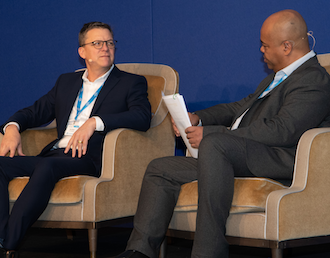 To say that BT is radically reconfiguring its business model would be to greatly understate the extent of the digital transformation underway.
To say that BT is radically reconfiguring its business model would be to greatly understate the extent of the digital transformation underway.
Of course, digital adoption is a priority for all businesses, but for those the size of BT it adds new dimensions to a task involving the near complete dislocation from its past.
In his Comms Vision (2-4 November, Gleneagles Hotel) fireside interview, Rob Shuter, CEO, Enterprise at BT, shared insights into how the business is navigating the complex transition by taking leaps, not steps.
"We have a lot of work to do to give our customers, partners and channels a modern digital experience," said Shuter. "There is transformation at all layers of the pyramid with BT deploying networks and infrastructure, bringing people up to speed and making sure we have the propositions that make us a partner of choice for some of the big platform providers.
"We need a BT that couples the benefits of the networks and infrastructure, the resources of a secure partner with the agility and innovation seen in smaller entities. It’s a big challenge, particularly as so much is changing."
Navigating the tipping point where scale meets agility must be achieved while mastering the challenges of modernising the wholesale model by deploying a digital solution stack, which is also a top priority.
"We’ve needed a transformation in the wholesale channel for many years," added Shuter. "We are embracing that change with a multi-million pound programme and a new portal for partners.
"The industry needs innovation from wholesale providers. Partners are more demanding, they see what's possible when using Amazon, for example. Expectations have risen significantly for digital experiences like easy straight-through processing, single order and digital migration.
"And we are all under pressure to be efficient and commercially successful. The markets are tough and the macro picture is not helping, so we all need to up our game."
This is no time to sit on the sidelines and tomorrow's winners will be those who execute their digital transformation strategies today.
For BT that means transforming the networks to next generation and bringing propositions into a whole new world. "Then there is the transformation of systems, culture, mindset, diversity and commercial orientation," added Shuter.
"This amounts to a complex four layer transformation - but there are many proof points that we are making progress. I would hope that our partners see a more commercially oriented, customer focused BT than a year or two ago."
Shuter is a 'great believer' in the power of culture and has taught about the intersection between strategy, execution and culture.
"It is a great truism that culture eats strategy for breakfast," he stated. "Organisations don’t change but people do, and the thing I’ve learned during my 30 years in business is that the biggest gap in the world is the gap between knowing and doing.
"We struggle to get ourselves organised to execute and make new habits. This is a big part of our cultural challenge to build a company that is agile, commercially oriented, customer oriented, and not relying so much on legacy services. That’s the way we’re going to be successful going forward."
Having a diverse workforce and diverse management is critical to achieving these goals, believes Shuter. "Bringing in people with different skills and different mindsets is fundamental," he commented.
"And I’m a great believer in the power of diverse teams. We’ve made progress here and my executive leadership team has a 50-50 gender mix. We weren't close to that before.
"Diversity has so many different elements and there is a lot of work that still needs to be done. If we want a vibrant diverse industry with the best talent, then there is no choice but to embrace diversity."
Shuter has always worked in industries he felt were doing something useful in the world. In comms that relates to connecting people and transforming the way companies work, for example. His first job in telecoms was, as a student, working on the residence switchboard to make ends meet. He went on to work in the banking sector and returned to comms in 2009.
"Banking is a traditional industry run in a modern way, and telco is a modern industry run in a traditional way," said Shuter.
But for how long? "Many of us grew up in the analogue-to-digital age," stated Shuter. "Today, it’s a digital-first mindset. It's also hybrid-first. In the old days the fixed and mobile worlds were separate, now there is an opportunity for these networks to come together.
"Customers are looking for convergence in how they buy and how solutions are delivered. It’s not just about billing and bundling - it’s about the hybrid experience."
Furthermore, the 2025 PSTN switch off is a 'massive change' for the industry, observed Shuter. "This infrastructure upgrade is a once in a generation event, and in times of change there are both opportunities and challenges," he added.
"Rolling out infrastructure creates opportunities for digital transformation for customers and a new conversation around how partners can help them.
"Generally, there is a commercial benefit to moving customers onto modern networks. The successful players in the industry are those that lean in to adopt new technologies as fast as possible and have a positive story for their customers."
Not surprisingly, as digital technology continues to overturn ways of doing business, customers and partners are looking for a digital experience from infrastructure providers. "It’s also important to have the right partnering approach," stated Shuter. "BT wants to marry the strengths of having digital networks across fixed and mobile coupled with great offerings and a partnering mindset."
